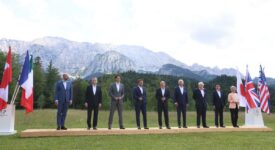The European Union has “so many reasons to be confident, self-assured and assertive. We cannot sit on our hands in the most critical debates of our time,” the new European Council President Charles Michel said on Friday (29 November). Calling for a more assertive role for Europe in the world, the former Belgian prime minister stressed that strengthening Europe’s sovereignty in the world is a shared priority for Brussels and the capitals, including for the new European Commission led by Ursula von der Leyen. Michel will be chairing the EU leaders’ gathering from 1 December and will represent the EU abroad on foreign and security issues.
Embattled at home in politically divided Belgium, Charles Michel might, as a successor to Poland’s Donald Tusk, in the end prove to be an unexpected, but suitable pick. While stressing that he is “open for dialogue” and “committed to building bridges”, Michel also warned against complacency, saying that “we live in peace but we must remain vigilant.” This is why he argued that Europe should do more for European defense and security, which will also allow it to project a more self-confident image to the rest of the world, as well as protect guarantees and freedoms.
Meanwhile, in the context of a more confident European Union, the new Commission chief, Ursula von der Leyen, last week introduced the gathered MEPs in Strasbourg to the idea of a ‘geopolitical Commission’. Although she did not specifically mention Africa, the continent’s political and business leaders have generally been encouraged by the rhetoric of the incoming Commission. Still, the EU-Africa Business summit, held in Marrakech last week, voiced the often-repeated message that while the investment in African infrastructure is more needed than ever before, the signals from von der Leyen are that there is not much extra cash.
So, the question is how the new Commission wants to be ‘geopolitical’ if the EU fails to provide any sizable funding to build roads, ports, bridges and railways all across Africa, while it is its growing geopolitical competitor – China – who is more likely to provide the badly needed cash. True, the EU is still the largest single donor in Africa that has pledged to fund technical assistance to make the African Continent Free Trade Area a reality. But while aid supports development, it is trade that helps develop higher living standards in underdeveloped societies. Ultimately, unequal and lop-sided trade relations between the EU and African countries, in which the latter run large trade deficits, are one of the root causes of the current rise of economic migration across the Mediterranean.
Article Categories:
EUROPE'S NEIGHBORHOOD






